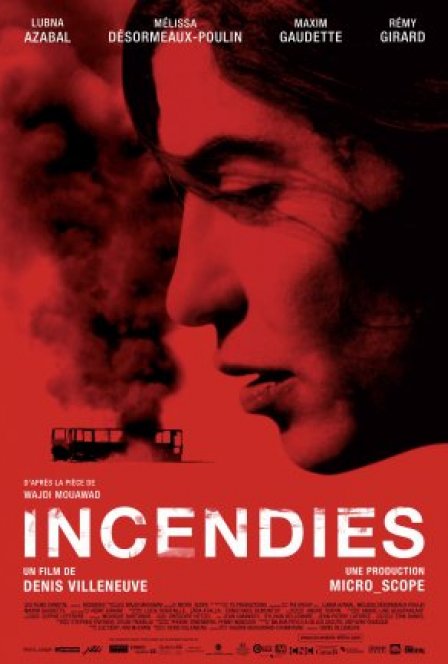The opening moments of Denis Villeneuve’s Incendies seem to prepare the audience for a particularly heavy-handed political film: it opens with shots of a desert, then wanders on to images of small Arab boys having their heads shaved by militiamen, with Radiohead’s “You and Whose Army” unsubtly monopolizing the audio. A lingering image of one of the boys, staring straight into the camera as his hair falls onto his shoulders, abruptly pans to a shot of a North American notary in his storeroom, leaning against shelves crowded with filing. It feels like a pedantic music video, but as the film’s complexity develops, this overture comes to serve as a place for Villeneuve to announce his themes — inevitability, powerlessness, the necessity of serving as witness — before piling headfirst into his narrative.
The man in the filing closet turns out to be a Montreal notary, collecting the will of his secretary from his files. The secretary’s twin children, Jeanne and Simon, sit in his office and listen as he recounts their mother’s final melodramatic wishes: to be buried naked, face-down, with no headstone. The notary, Jean, played solidly by Rémy Girard, then hands each of the children letters, which are to be delivered to their father (supposedly dead) and brother (hitherto unmentioned). After the letters are delivered, the mother, Nawal (Lubna Azabal), will permit herself a headstone. Here, the film quickly becomes a cryptic mystery, one that will spend the next two hours unfolding into either an engrossing family fable or a manipulative piece of operatic hyperdrama, depending on how far you’re willing to let Villeneuve take you.
Jeanne (Mélissa Désormeaux-Poulin) travels to an unnamed Middle Eastern country (it’s Lebanon, but not quite) in order to track down her mother’s family. Jeanne’s journey is intercut with visions of Nawal’s travels, two decades earlier, first as she gives birth to an illegitimate child and then as she is banished from her home, a disgrace to her family. What follows, for Nawal, is an ever-heightening series of personal disasters as she travels throughout the region while her country falls further into protracted civil war. Villeneuve’s presentation of Nawal’s endless tragedies is stoic in its presentation — the camera holds still as Nawal endures a catalogue of brutality, trauma, and violation, each shot framed and blocked so deeply that Villeneuve can earn moments that, on their own, might seem cloying or overwrought. One particular shot, of Nawal kneeling in front of a bus engulfed in flames, comes about after one of the most visceral, suspenseful sequences I’ve experienced in awhile, the shot so deliberately staged as to make it seem like the smoke is actually rising from Nawal’s hair.
Villeneuve’s gradual presentation of Nawal’s story, braided as it is with Jeanne’s slow discovery of the true history of her mother’s life, never seems to drag; before too long, there is always another, darker turn to Nawal’s history. By the time Jeanne and her brother (Maxim Gaudette) discover the truth about their family, Villeneuve has managed to exhaust his characters and his audience; the film’s final twist, planted somewhere in the borderlands between disbelief and outright mythology, feels like both a reach and a tremendous payoff. It’s easy to call out independent and foreign films for aimlessness, for good premises but an allergy to resolutions; Incendies satisfies, for the most part, because it refuses to simply peter out. Villeneuve (working nominally from a play by Wajdi Mouawad) has crafted a film that feels both meditative and immediate, and the labyrinth he creates isn’t one he’s willing to simply abandon without a meaningful conclusion, dark though that end may be.
Villeneuve has previously dealt primarily in tragedy, especially in his last feature Polytechnique, a retelling of the 1989 Montreal school massacre that left 14 women dead. Incendies, his fourth feature, shares thematic threads with that film, particularly since both focus on indiscriminate death and chaos and their effects on the lives of survivors. Now, however, Villeneuve has honed his craft to the point where his work can find purchase outside Quebec; Incendies was nominated and considered a favorite for an Oscar this year, and supposedly Villeneuve has been chosen to helm Prisoners, a Boston-based kidnapping film. With Incendies, he’s adeptly traversed the path between weighty fable-telling and broadly appealing drama. Those who go into this film with skepticism will probably find themselves rewarded, but those willing to let Villeneuve’s relentlessness overwhelm them may find deeper rewards still.

